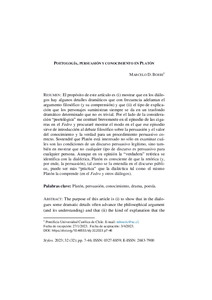Por favor, use este identificador para citar o enlazar este ítem:
https://repositorio.uca.edu.ar/handle/123456789/17906| Título: | Poetología, persuasión y conocimiento en Platón | Autor: | Boeri, Marcelo D. | Palabras clave: | POESIA; DRAMA; PERSUASION; CONOCIMIENTO; Platón, 427-347 a. C. | Fecha de publicación: | 2023 | Editorial: | Pontificia Universidad Católica Argentina. Facultad de Filosofía y Letras. Instituto de estudios grecolatinos "Prof. F. Nóvoa" | Cita: | Boeri, M. D. Poetología, persuasión y conocimiento en Platón [en línea]. Stylos. 2023, 32. doi: 10.46553/sty.32.2023.p7-46. Disponible en: https://repositorio.uca.edu.ar/handle/123456789/17906 | Resumen: | Resumen: El propósito de este artículo es (i) mostrar que en los diálogos
hay algunos detalles dramáticos que con frecuencia adelantan el
argumento filosófico (y su comprensión) y que (ii) el tipo de explicación
que los personajes suministran siempre se da en un trasfondo
dramático determinado que no es trivial. Por el lado de la consideración
“poetológica” me centraré brevemente en el episodio de las cigarras
en el Fedro y procuraré mostrar el modo en el que ese episodio
sirve de introducción al debate filosófico sobre la persuasión y el valor
del conocimiento y la verdad para un procedimiento persuasivo correcto.
Sostendré que Platón está interesado no sólo en examinar cuáles
son las condiciones de un discurso persuasivo legítimo, sino también
en mostrar que no cualquier tipo de discurso es persuasivo para
cualquier persona. Aunque en su opinión la “verdadera” retórica se
identifica con la dialéctica, Platón es consciente de que la retórica (y,
por ende, la persuasión), tal como se la entendía en el discurso público,
puede ser más “práctica” que la dialéctica tal como el mismo
Platón la comprende (en el Fedro y otros diálogos). Abstract: The purpose of this article is (i) to show that in the dialogues some dramatic details often advance the philosophical argument (and its understanding) and that (ii) the kind of explanation that the characters provide is always given against a particular dramatic background that is not trivial. On the side of the "poetological" consideration, I will briefly focus on the episode of the cicadas in the Phaedrus and try to show how this episode serves as an introduction to the philosophical debate on persuasion and the value of knowledge and truth for a correct persuasive procedure. I will argue that Plato is interested not only in examining the conditions of legitimate persuasive discourse, but also in showing that not any kind of discourse is persuasive to any person. Although in his view "true" rhetoric is identified with dialectic, Plato is aware that rhetoric (and thus persuasion), as it was understood in public discourse, may be more "practical" than dialectic, as Plato himself understands it (in the Phaedrus and other dialogues). |
URI: | https://repositorio.uca.edu.ar/handle/123456789/17906 | ISSN: | 0327-8859 (impreso) 2683-7900 (online) |
Disciplina: | LITERATURA | DOI: | 10.46553/sty.32.2023.p7-46 | Derechos: | Acceso abierto | Fuente: | Stylos. 2023, 32 |
| Aparece en las colecciones: | STY - 2023 nro. 32 |
Ficheros en este ítem:
| Fichero | Descripción | Tamaño | Formato | |
|---|---|---|---|---|
| poetologia-persuasion.pdf | 496,45 kB | Adobe PDF |  Visualizar/Abrir |
Visualizaciones de página(s)
16
comprobado en 27-abr-2024
Descarga(s)
5
comprobado en 27-abr-2024
Google ScholarTM
Ver en Google Scholar
Altmetric
Altmetric
Este ítem está sujeto a una Licencia Creative Commons

